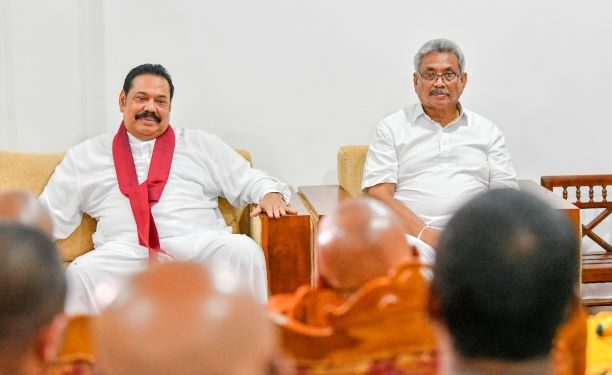
By Asiri Fernando and Saeed Shah/Wall Street Journal
Colombo, August 7: The Rajapaksa family cemented its grip on Sri Lanka in parliamentary elections, according to results released Friday, gaining enough seats to push through constitutional changes increasing executive power.
With the win, Mahinda Rajapaksa will remain prime minister—but now with a supermajority in Parliament—and lead with his brother Gotabaya Rajapaksa,elected president in November. With a message of stability and strong leadership, the brothers’ Sri Lanka Podujana Peramuna party won over voters hammered by a weakening economy anddevastating terrorist attacks—though its focused appeal to the majority Sinhala Buddhist population raises concerns for the island nation’s large minority communities.
“Real triumph is born of challenges,” Mahinda Rajapaksa said, in a statement. “By winning the war, and the war on the COVID-19 pandemic, as well as by conducting a successful election such as this, we show the world the strength of our country and its people.”
Mahinda Rajapaksa had been serving as prime minister with a minority government since his predecessor, from a rival party, resigned following November’s presidential election. Seen as the more charismatic and popular of the brothers, he had served as president between 2005 and 2015, as Sri Lanka embraced China, becoming a showcase for Beijing’s global infrastructure initiative.
The port of Hambantota, developed by China in the Rajapaksas’ hometown, became an emblem of what Washington calls Beijing’s “debt-trap diplomacy” after the next government—unable to afford the payments—handed it over to China on a 99-year lease.
Beijing says it is a commercial port, but the U.S. sees it as a possible strategic asset for China that could have military purposes. Sri Lanka sits on major shipping routes across the Indian Ocean, and Washington sees itself in competition with China for influence across Asia.
This time, the brothers promise more balanced relations with foreign powers, in particular keeping neighbor India close and maintaining ties with the U.S. Both countries have expressed alarm at growing Chinese influence in Sri Lanka.
Palitha Kohona, foreign secretary when Mahinda Rajapaksa was president, said it isn’t in Sri Lanka’s interests to be a site for competition between outsiders. But the country was desperate for investment after the civil war, he said, and only China delivered.
“We will maintain close relations with anyone willing to help us, including the United States and Europe,” said Mr. Kohona. “If China is going to be the only one that comes to the party, then I don’t think the others have cause to complain.”
Indian Prime Minister Narendra Modi, whose country is in a standoff with China over a disputed border, was the first foreign leader to congratulate Mahinda Rajapaksa on Thursday night. Mr. Modi said in a subsequent tweet that the two countries will work together “to take our special ties to ever newer heights.”
The U.S. Embassy in Colombo on Friday called on the new government to “renew its commitments to building an inclusive economic recovery, upholding human rights and the rule of law, and protecting the country’s sovereignty.”
The Sri Lankan economy has been hit by a slump in tourists, driven away first by the April 2019 terrorist attack and then by the coronavirus, which has also sapped exports and remittances from overseas Sri Lankans. The Rajapaksa brothers have an infrastructure wish list that includes major road and rail projects—the kind of big construction initiatives that China specializes in.
The brothers’ brand of populist politics could again drive the country “headlong into China’s arms” if Beijing is willing to pick up the tab, said Paikiasothy Saravanamuttu, head of the Center for Policy Alternatives, a think tank in Colombo. It could also damage relations with the country’s Muslim and ethnic Tamil minority communities, he said.
“That whole notion of Sri Lanka being a nation of unity and diversity will be thrown out of the window,” he said. “It’s going to be very much a Sinhala-Buddhist identity—a majoritarian, authoritarian government, with a large dose of the military mind-set thrown in.”
As defense secretary during his brother’s presidency, Gotabaya Rajapaksa oversaw the brutal end to Sri Lanka’s three-decade war, crushing the ethnic Tamil rebels in 2009. Human rights groups allege large numbers of Tamil civilians were killed in crossfire.
The brothers deny human-rights abuses and say they will work for all communities. Their war record has won them support among the majority, which is ethnic Sinhalese and religiously Buddhist, further strengthened last year when Islamic State-inspired local militants killed more than 250 people in simultaneous suicide bombings of churches and tourist hotels.
The brothers say they will repeal an amendment added to the constitution by a previous government in 2015, which stripped power from the presidency in favor of the prime minister and introduced checks on the executive by establishing independent commissions for human rights, elections, control of law enforcement and administration of the judiciary.
The Rajapaksas say splitting power between the president and the prime minister resulted in a tug of war over national security, which they blame for missing intelligence that could have prevented the April 2019 terrorist attack.
